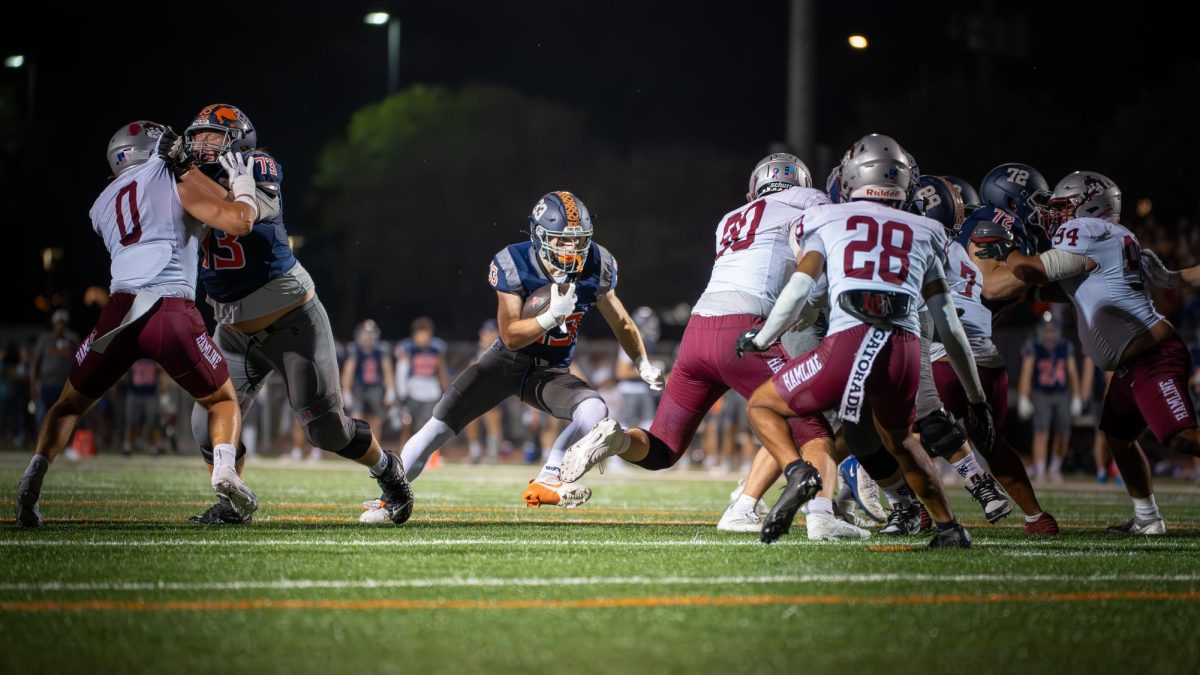It’s hard to believe, but Blaine Gabbert’s backup is the most talked-about man in the NFL right now. Colin Kaepernick’s career has taken a number of unusual turns for him to end up as second-string quarterback but first-string conversation starter.
And it truly is a conversation, national in scope and quite polarizing. Kaepernick has leveraged the visibility of the NFL to make his protest ubiquitous. It’s impossible to ignore the debate over his actions, which means that we feel compelled to form an opinion one way or the other.
For readers who are unaware, Kaepernick, a quarterback for the San Francisco 49ers, has begun protesting racial violence and police brutality during football games by taking a knee on the sidelines during the playing of the national anthem. Starting in the preseason, his protests have now stretched over a month, with other athletes both inside and outside football joining him, including soccer player Megan Rapinoe, football players Arian Foster and Brandon Marshall (the linebacker for the Broncos), the entire Howard University cheerleading squad and a number of high school football teams across the country, including teams at nearby Minneapolis North and Edina. Other athletes have chosen to protest by raising one fist at the end of the anthem, as Martellus Bennett did during a primetime New England Patriots game.
Generally, public opinion on these protests falls into one of two camps. On one side are those who see the protest of the flag as being disrespectful to members of the U.S. military and those who serve the country. On the other end of the spectrum are those who see Kaepernick as exposing and drawing attention to serious issues in contemporary America.
Jeremy Stephan ’19 falls into the group that doesn’t necessarily support Kaepernick. I asked him to elaborate on his point of view. He told me, “I think that as Americans, we’re privileged to be able to have freedom of speech. I’m not against him practicing that, but it seems like Kaepernick isn’t addressing an issue, it’s more drawing attention to himself. And that doesn’t mean that the U.S. is perfect, drawing attention to those issues is important. It just seems out of place and disrespectful to not stand. The flag and the national anthem represent, in my opinion, an ideal we’re striving towards. There are tons of people who fight for our freedom of speech, servicemen and women… and it’s disrespectful to them.”
Stephan certainly isn’t alone. Michigan Wolverines’ head coach Jim Harbaugh tweeted “…I support Colin’s motivation. It’s his method of action that I take exception to.” New Orleans Saints quarterback Drew Brees stated that he “wholeheartedly disagrees” with Kaepernick’s protest, though he too clarified that Kaepernick can and should “speak out about a very important issue.”
From an objective point of view, each side of the argument has a lot in common with the other. Both sides consider themselves patriotic. While the argument against Kaepernick is that his actions are un-American, he doesn’t see them that way. He thinks of himself as much of a patriot as his detractors. Additionally, most people agree that America has issues that must be sorted out. Many of Kaepernick’s detractors only find fault with his mode of protest or him personally, not with his message.
Personally, I’ve been surprised with Kaepernick. While I was initially skeptical, he has turned into a quite credible mouthpiece for the social movement that he has started. He has promised to donate $1 million as part of his protest, and will set up a website that will track where the money goes in the interest of transparency. Additionally, he has vowed to donate the earnings from the recent spike in sales of his jersey.
A lot of criticism of Kaepernick is leveled at him personally, but that misses the point. The protests are simply a jumping-off point for a much bigger national conversation which is long overdue. A specific issue that Kaepernick has brought up is the killing of black men by police—since I started working on this article last week, there have already been two more incidents, one in North Carolina and one in Oklahoma. Every time it happens, we as Americans like to think that it won’t happen again, that the “conversations” that we have are going to fix the problem. They haven’t, but we are finally having the nationwide conversation that we said we were going to have in 2012 when Trayvon Martin was killed. Maybe Kaepernick had to inflame people (myself included) in order to draw attention to his cause. At this point, it’s clear that the national anthem protests are much larger than Kaepernick himself. They’ve taken on a life of their own, which is good. A movement can’t be criticized as easily as a man can, and the fact that Kaepernick’s actions have resonated so deeply with so many people lends them validation and credence.
Kaepernick has recently revealed that he has received death threats for his actions, which he points out just proves his point. And he’s right. While we may not agree with the quarterback’s protest, we must condemn the people that threaten him for expressing his First Amendment rights. The next step in this protest is for the people from both sides of the argument to come together and discuss. The “conversation” ends if it is one-sided, or only occurs between people who already agree with one another. We’re as close as we’ve come to really reaching the tipping point on the racial tensions that America is currently facing. If we back down now, we lose the momentum that we’ve gained. And this momentum, hate him or love him, is due at least in part to Colin Kaepernick, 49ers backup-quarterback.







Joan Nolan • Sep 6, 2019 at 9:05 am
This really answered my drawback, thank you!